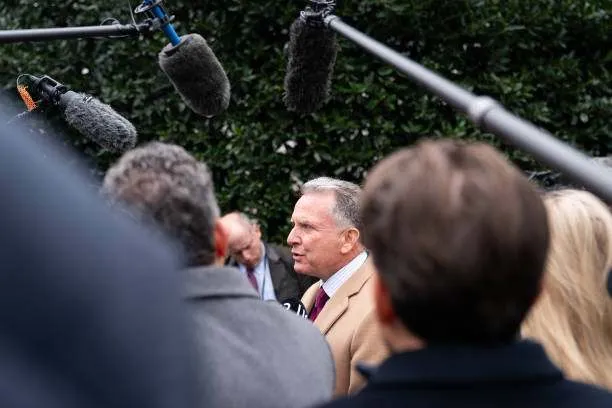Steve Witkoff’s visit to Russia signals US push for Ukraine ceasefire
US envoy’s third trip to Moscow highlights Trump’s diplomatic efforts on Ukraine.
 |
| U.S. Special Envoy to the Middle East Steve Witkoff speaks to the media at the White House in Washington, D.C., on March 6, 2025. Photo by Allison Robbert/Getty Images |
By Anna Fadiah and Hayu Andini
Steve Witkoff’s visit to Russia on Friday marked his third official trip to the country this year, underscoring a renewed U.S. push to broker a ceasefire in the ongoing conflict between Russia and Ukraine. The visit comes amid growing frustration in Washington over the lack of progress in peace efforts and the mounting toll of a war that has stretched beyond three years.
The Kremlin confirmed Witkoff’s arrival in Moscow, though it did not immediately clarify whether a direct meeting with Russian President Vladimir Putin would take place. Kremlin spokesman Dmitry Peskov told reporters that the envoy had indeed landed and that any meeting involving the Russian president would be announced "if it happens."
Witkoff, a prominent figure in real estate and a long-time ally of U.S. President Donald Trump, has emerged as a key diplomatic figure in the White House’s evolving foreign policy playbook. His background, though unconventional for diplomacy, reflects Trump’s preference for direct, relationship-driven negotiations—a hallmark of his administration’s broader geopolitical strategy.
A high-stakes mission
Steve Witkoff’s visit to Russia is part of a broader campaign by President Trump to break the stalemate in Ukraine. Despite multiple ceasefire attempts and international mediation efforts, fighting continues to flare along the front lines in eastern Ukraine, costing thousands of lives and displacing many more.
According to officials familiar with the matter, Witkoff’s current mission is focused on encouraging both Moscow and Kyiv to agree to a temporary ceasefire that could open the door to a more lasting resolution. The stakes are high, especially with mounting pressure from European allies and a divided Congress back home.
Trump, now in his second term after returning to office in January, has reportedly grown impatient with both sides. According to White House insiders, he has privately expressed his dissatisfaction with the lack of meaningful dialogue and has blamed both Russian President Vladimir Putin and Ukrainian President Volodymyr Zelensky for dragging their feet.
A controversial envoy
Witkoff’s role has raised eyebrows in diplomatic circles. A developer with deep ties to Trump’s business empire, he is not a traditional envoy by any means. Yet, his personal relationship with the U.S. president appears to be one of his strongest assets in navigating sensitive international terrain.
Following his previous meeting with Putin earlier this year, Witkoff made headlines by referring to the Russian leader as a “great leader” and “not a bad guy.” These remarks drew criticism from both sides of the political aisle in Washington, especially among lawmakers wary of warming ties with Moscow.
Critics argue that Witkoff’s inexperience in foreign policy could pose risks at a time when careful diplomacy is essential. However, supporters claim that his outsider status and close connection to Trump give him unique leverage in conversations that might otherwise stall under traditional channels.
The Kremlin’s response
While the Kremlin has remained guarded about the details of Witkoff’s agenda, Russian officials have signaled a willingness to engage in discussions. “We confirm the arrival of Mr. Witkoff,” Peskov said during a televised briefing. “If any meetings are scheduled with President Putin, we will inform the media accordingly.”
Behind the scenes, sources in Moscow suggest that the Russian government sees Witkoff’s visit as a potential opening to ease tensions with the West—especially given Trump’s historically more conciliatory tone toward the Kremlin compared to previous U.S. administrations.
Analysts believe that Russia may use this round of talks to seek relief from international sanctions or to push for security guarantees in the contested regions of eastern Ukraine.
Steve Witkoff’s visit to Russia highlights a pivotal moment in the ongoing conflict. While past efforts at diplomacy have repeatedly broken down, the Trump administration appears determined to try a new approach. Whether Witkoff’s unconventional background proves to be a liability or a strategic advantage remains to be seen.
For now, the visit serves as a signal that Washington is not stepping back from its involvement in Ukraine. Instead, it is doubling down on personal diplomacy, bypassing traditional routes in favor of a more transactional model that mirrors Trump’s broader political philosophy.
Some experts warn that the U.S. risks undermining its credibility on the global stage if it leans too heavily on personal emissaries without the backing of seasoned diplomats. Others suggest that a fresh perspective, unburdened by bureaucratic inertia, could bring much-needed momentum to a conflict that has become all too familiar.
What comes next?
If Steve Witkoff’s visit to Russia succeeds in securing even a short-term ceasefire, it could mark a significant diplomatic breakthrough for the Trump administration. Such a development would not only bolster Trump’s foreign policy credentials but also offer a rare moment of cooperation in a deeply polarized international environment.
However, if talks collapse or fail to yield results, criticism is likely to intensify—not just over Trump’s choice of envoy, but over the administration’s broader handling of U.S.-Russia relations.
With the war in Ukraine showing no signs of abating, the urgency for diplomatic resolution has never been greater. For now, all eyes are on Moscow as Witkoff, the unlikely envoy, takes center stage in one of the world’s most consequential conflicts.
